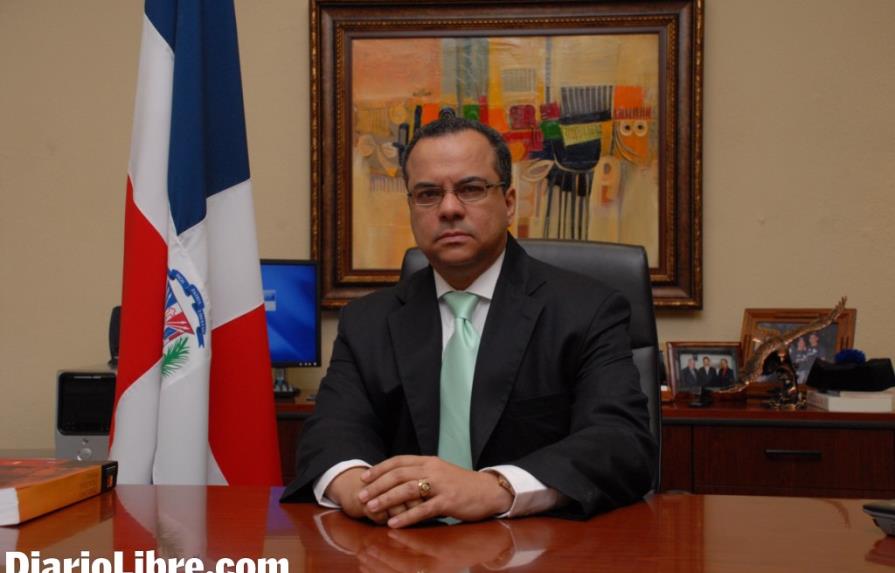Judge orders notification of evidence in Felix Bautista case
The defendants argue that their rights are being violated

SANTO DOMINGO. The judge of Special Instruction of the Supreme Court of Justice (SCJ), Alejandro Moscoso Segarra, ordered that the Attorney General of the Republic notifies Senator Felix Bautista and the other defendants of the evidence that sustains the accusation presented against them.
The magistrate adopted the decision, so that the secretary of Organization of the Dominican Liberation Party (PLD), as well as Soraida Antonia Abreu Martínez, José Elías Hernández García, Bolívar Antonio Ventura Rodríguez, Carlos Manuel Ozoria Martínez, Gricel Aracelis Soler Pimentel and Bienvenido Apolinar Bretón Medina can respond to the evidence on which the lawsuit filed by the Attorney General Francisco Dominguez Brito is based.
The measure was made known to the Justice Department through a judicial writ, transmitted by the Secretary-General of the SCJ.
On 22 October, the Attorney General presented a formal accusation against the legislator, who is accused of alleged violations of the Constitution, falsification of public documents, falsification of private documents, the use of false documents, prevarication, fraud and issues incompatible with the status of a public official.
The charges against the other defendants are alleged complicity in these acts. The AG suggested that in the course of the investigation carried out and contained in the accusation, presumably they were able to determine that with the product of the illicit actions that they committed against the State, Bautista allegedly obtained for himself and his relations property and real estate assets, acquired in his own name, as well as the names of his companies and related persons.
Dominguez Brito says that in order to do this he had the alleged active participation of the other defendants, together with whom he developed a wide circuit for money laundering, "in order to try to give the appearance of legitimate money to the illegitimate money that he obtained as a result of the illicit actions that he committed against the Dominican state."
Bautista stated that he was "a victim of a political persecution by the Attorney General," because he sees him as one of his great obstacles. He attributes the embargo on real estate assets ordered by the Attorney General, with warning notes or oppositions to any sort of sale to this situation.
Dominguez Brito has rejected the idea that this accusation and request for preventive custody might be a sort of political retaliation against Bautista, because in all of the cases of alleged corruption that he has worked he always uses the same argument. He said that the accusation, containing a request for preventive custody and the accusation for serious crimes of corruption and money laundering is the culmination of a year-long investigation.
Bautista's defense lawyers, Juan Antonio Delgado, Pedro Balbuena, and Ramon Emilio Nuñez, argued that the deadline for the notification of the evidence expired, so that they are violating the right of a defense and due process in the case.
At the same time, the Attorney General of the Republic is represented in the case by the adjunct Attorney General, Pedro Castillo Diaz, the director of the Specialized Prosecutor for the Persecution of Administrative Corruption, Laura Guerrero Pelletier, Pelagio Alcantara and Narciso Escaño.
The devolution
The defense argues that article 298 of the Penal Process Code establishes the procedures when an accusation is presented. It orders that when the accusation is presented, the Secretary of the tribunal notifies the parties and informs the Justice Department that it has available for them the evidence brought together during the investigation, who can then examine them in the normal timeframe of 5 days, objective requirements and oppose exceptions.
The magistrate adopted the decision, so that the secretary of Organization of the Dominican Liberation Party (PLD), as well as Soraida Antonia Abreu Martínez, José Elías Hernández García, Bolívar Antonio Ventura Rodríguez, Carlos Manuel Ozoria Martínez, Gricel Aracelis Soler Pimentel and Bienvenido Apolinar Bretón Medina can respond to the evidence on which the lawsuit filed by the Attorney General Francisco Dominguez Brito is based.
The measure was made known to the Justice Department through a judicial writ, transmitted by the Secretary-General of the SCJ.
On 22 October, the Attorney General presented a formal accusation against the legislator, who is accused of alleged violations of the Constitution, falsification of public documents, falsification of private documents, the use of false documents, prevarication, fraud and issues incompatible with the status of a public official.
The charges against the other defendants are alleged complicity in these acts. The AG suggested that in the course of the investigation carried out and contained in the accusation, presumably they were able to determine that with the product of the illicit actions that they committed against the State, Bautista allegedly obtained for himself and his relations property and real estate assets, acquired in his own name, as well as the names of his companies and related persons.
Dominguez Brito says that in order to do this he had the alleged active participation of the other defendants, together with whom he developed a wide circuit for money laundering, "in order to try to give the appearance of legitimate money to the illegitimate money that he obtained as a result of the illicit actions that he committed against the Dominican state."
Bautista stated that he was "a victim of a political persecution by the Attorney General," because he sees him as one of his great obstacles. He attributes the embargo on real estate assets ordered by the Attorney General, with warning notes or oppositions to any sort of sale to this situation.
Dominguez Brito has rejected the idea that this accusation and request for preventive custody might be a sort of political retaliation against Bautista, because in all of the cases of alleged corruption that he has worked he always uses the same argument. He said that the accusation, containing a request for preventive custody and the accusation for serious crimes of corruption and money laundering is the culmination of a year-long investigation.
Bautista's defense lawyers, Juan Antonio Delgado, Pedro Balbuena, and Ramon Emilio Nuñez, argued that the deadline for the notification of the evidence expired, so that they are violating the right of a defense and due process in the case.
At the same time, the Attorney General of the Republic is represented in the case by the adjunct Attorney General, Pedro Castillo Diaz, the director of the Specialized Prosecutor for the Persecution of Administrative Corruption, Laura Guerrero Pelletier, Pelagio Alcantara and Narciso Escaño.
The devolution
The defense argues that article 298 of the Penal Process Code establishes the procedures when an accusation is presented. It orders that when the accusation is presented, the Secretary of the tribunal notifies the parties and informs the Justice Department that it has available for them the evidence brought together during the investigation, who can then examine them in the normal timeframe of 5 days, objective requirements and oppose exceptions.


 Diario Libre
Diario Libre
 Diario Libre
Diario Libre